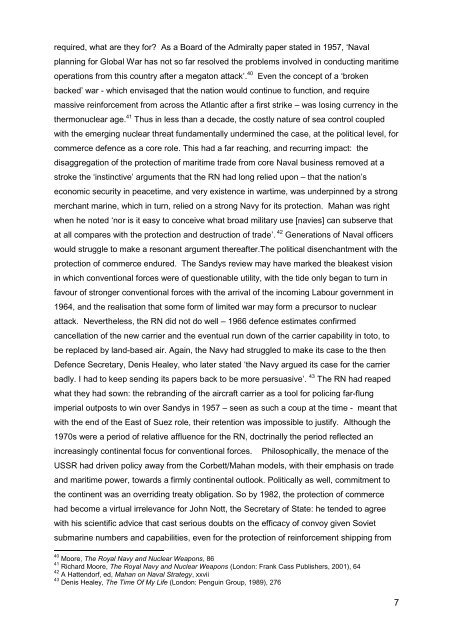90 percent by sea - Defence Academy of the United Kingdom
90 percent by sea - Defence Academy of the United Kingdom
90 percent by sea - Defence Academy of the United Kingdom
You also want an ePaper? Increase the reach of your titles
YUMPU automatically turns print PDFs into web optimized ePapers that Google loves.
equired, what are <strong>the</strong>y for? As a Board <strong>of</strong> <strong>the</strong> Admiralty paper stated in 1957, ‘Naval<br />
planning for Global War has not so far resolved <strong>the</strong> problems involved in conducting maritime<br />
operations from this country after a megaton attack’. 40 Even <strong>the</strong> concept <strong>of</strong> a ‘broken<br />
backed’ war - which envisaged that <strong>the</strong> nation would continue to function, and require<br />
massive reinforcement from across <strong>the</strong> Atlantic after a first strike – was losing currency in <strong>the</strong><br />
<strong>the</strong>rmonuclear age. 41 Thus in less than a decade, <strong>the</strong> costly nature <strong>of</strong> <strong>sea</strong> control coupled<br />
with <strong>the</strong> emerging nuclear threat fundamentally undermined <strong>the</strong> case, at <strong>the</strong> political level, for<br />
commerce defence as a core role. This had a far reaching, and recurring impact: <strong>the</strong><br />
disaggregation <strong>of</strong> <strong>the</strong> protection <strong>of</strong> maritime trade from core Naval business removed at a<br />
stroke <strong>the</strong> ‘instinctive’ arguments that <strong>the</strong> RN had long relied upon – that <strong>the</strong> nation’s<br />
economic security in peacetime, and very existence in wartime, was underpinned <strong>by</strong> a strong<br />
merchant marine, which in turn, relied on a strong Navy for its protection. Mahan was right<br />
when he noted ‘nor is it easy to conceive what broad military use [navies] can subserve that<br />
at all compares with <strong>the</strong> protection and destruction <strong>of</strong> trade’. 42 Generations <strong>of</strong> Naval <strong>of</strong>ficers<br />
would struggle to make a resonant argument <strong>the</strong>reafter.The political disenchantment with <strong>the</strong><br />
protection <strong>of</strong> commerce endured. The Sandys review may have marked <strong>the</strong> bleakest vision<br />
in which conventional forces were <strong>of</strong> questionable utility, with <strong>the</strong> tide only began to turn in<br />
favour <strong>of</strong> stronger conventional forces with <strong>the</strong> arrival <strong>of</strong> <strong>the</strong> incoming Labour government in<br />
1964, and <strong>the</strong> realisation that some form <strong>of</strong> limited war may form a precursor to nuclear<br />
attack. Never<strong>the</strong>less, <strong>the</strong> RN did not do well – 1966 defence estimates confirmed<br />
cancellation <strong>of</strong> <strong>the</strong> new carrier and <strong>the</strong> eventual run down <strong>of</strong> <strong>the</strong> carrier capability in toto, to<br />
be replaced <strong>by</strong> land-based air. Again, <strong>the</strong> Navy had struggled to make its case to <strong>the</strong> <strong>the</strong>n<br />
<strong>Defence</strong> Secretary, Denis Healey, who later stated ‘<strong>the</strong> Navy argued its case for <strong>the</strong> carrier<br />
badly. I had to keep sending its papers back to be more persuasive’. 43 The RN had reaped<br />
what <strong>the</strong>y had sown: <strong>the</strong> rebranding <strong>of</strong> <strong>the</strong> aircraft carrier as a tool for policing far-flung<br />
imperial outposts to win over Sandys in 1957 – seen as such a coup at <strong>the</strong> time - meant that<br />
with <strong>the</strong> end <strong>of</strong> <strong>the</strong> East <strong>of</strong> Suez role, <strong>the</strong>ir retention was impossible to justify. Although <strong>the</strong><br />
1970s were a period <strong>of</strong> relative affluence for <strong>the</strong> RN, doctrinally <strong>the</strong> period reflected an<br />
increasingly continental focus for conventional forces. Philosophically, <strong>the</strong> menace <strong>of</strong> <strong>the</strong><br />
USSR had driven policy away from <strong>the</strong> Corbett/Mahan models, with <strong>the</strong>ir emphasis on trade<br />
and maritime power, towards a firmly continental outlook. Politically as well, commitment to<br />
<strong>the</strong> continent was an overriding treaty obligation. So <strong>by</strong> 1982, <strong>the</strong> protection <strong>of</strong> commerce<br />
had become a virtual irrelevance for John Nott, <strong>the</strong> Secretary <strong>of</strong> State: he tended to agree<br />
with his scientific advice that cast serious doubts on <strong>the</strong> efficacy <strong>of</strong> convoy given Soviet<br />
submarine numbers and capabilities, even for <strong>the</strong> protection <strong>of</strong> reinforcement shipping from<br />
40 Moore, The Royal Navy and Nuclear Weapons, 86<br />
41 Richard Moore, The Royal Navy and Nuclear Weapons (London: Frank Cass Publishers, 2001), 64<br />
42 A Hattendorf, ed, Mahan on Naval Strategy, xxvii<br />
43 Denis Healey, The Time Of My Life (London: Penguin Group, 1989), 276<br />
7

















